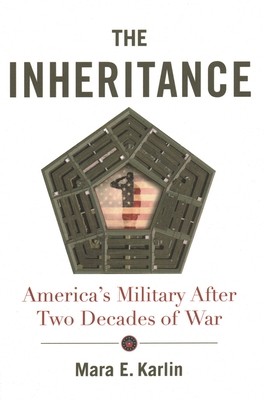
- We will send in 10–14 business days.
- Author: Mara E Karlin
- Publisher: Brookings Institution Press
- ISBN-10: 0815738455
- ISBN-13: 9780815738459
- Format: 15.2 x 22.9 x 2.8 cm, softcover
- Language: English
- SAVE -10% with code: EXTRA
Reviews
Description
Exploring how the U.S. military can move beyond Iraq and Afghanistan
Since the September 11, 2001, attacks, the U.S. military has been fighting incessantly in conflicts around the globe, often with inconclusive results. The legacies of these conflicts have serious implications for how the United States will wage war in the future. Yet there is a stunning lack of introspection about these conflicts.
Never in modern U.S. history has the military been at war for so long. And never in U.S. history have such long wars demanded so much of so few. The legacy of wars without end include a military that feels the painful effects of war but often feels alone. The public is less connected to the military now than at any point in modern U.S. history. The national security apparatus seeks to pivot away from these engagements and to move on to the next threats--notably those emanating from China and Russia. Many young Americans question whether it even makes sense to invest in the military. At best, there are ad hoc, unstructured debates about Iraq or Afghanistan. Simply put, there has been no serious, organized stock-taking by the public, politicians, opinion leaders, or the military itself of this inheritance.
Despite being at war for the longest continuous period in its history, the military is woefully unprepared for future wars. But the United States cannot simply hit the reset button. This book explores this inheritance by examining how nearly two decades of war have influenced civil-military relations, how the military goes to war, how the military wages war, who leads the military and who serves in it, how the military thinks about war, and above all, the enduring impact of these wars on those who waged them. If the U.S. military seeks to win in the future, it must acknowledge and reconcile with the inheritance of its long and inconclusive wars. This book seeks to help them do so.
EXTRA 10 % discount with code: EXTRA
The promotion ends in 18d.08:15:44
The discount code is valid when purchasing from 10 €. Discounts do not stack.
- Author: Mara E Karlin
- Publisher: Brookings Institution Press
- ISBN-10: 0815738455
- ISBN-13: 9780815738459
- Format: 15.2 x 22.9 x 2.8 cm, softcover
- Language: English English
Exploring how the U.S. military can move beyond Iraq and Afghanistan
Since the September 11, 2001, attacks, the U.S. military has been fighting incessantly in conflicts around the globe, often with inconclusive results. The legacies of these conflicts have serious implications for how the United States will wage war in the future. Yet there is a stunning lack of introspection about these conflicts.
Never in modern U.S. history has the military been at war for so long. And never in U.S. history have such long wars demanded so much of so few. The legacy of wars without end include a military that feels the painful effects of war but often feels alone. The public is less connected to the military now than at any point in modern U.S. history. The national security apparatus seeks to pivot away from these engagements and to move on to the next threats--notably those emanating from China and Russia. Many young Americans question whether it even makes sense to invest in the military. At best, there are ad hoc, unstructured debates about Iraq or Afghanistan. Simply put, there has been no serious, organized stock-taking by the public, politicians, opinion leaders, or the military itself of this inheritance.
Despite being at war for the longest continuous period in its history, the military is woefully unprepared for future wars. But the United States cannot simply hit the reset button. This book explores this inheritance by examining how nearly two decades of war have influenced civil-military relations, how the military goes to war, how the military wages war, who leads the military and who serves in it, how the military thinks about war, and above all, the enduring impact of these wars on those who waged them. If the U.S. military seeks to win in the future, it must acknowledge and reconcile with the inheritance of its long and inconclusive wars. This book seeks to help them do so.


Reviews